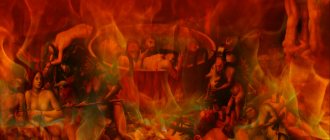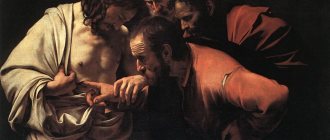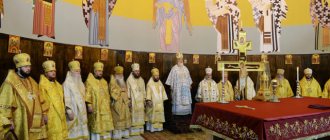Whether God exists or not has been debated for hundreds of years. Believers diligently argue their views, while skeptics just as diligently refute them. In this article we will touch upon 5 proofs of the existence of God by Thomas Aquinas. We will also look at examples of refutation in order to clearly understand the strengths and weaknesses of this system.
About the proofs of Saint Thomas
Saint Thomas Aquinas is a famous Catholic theologian, whose works have acquired the status of the official creed of the Western Church, led by the Papal See in Rome. The mentioned 5 proofs of the existence of God by Thomas Aquinas were set out by him in a fundamental work called “Summa Theology”. In it, the author, among other things, argued that the existence of the Creator can be proven in two ways, namely with the help of cause and with the help of effect. In other words, we are talking about arguments from cause to effect and from effect to cause. Thomas Aquinas's five proofs for the existence of God are based on the second approach. Their general logic is as follows: since there are obvious consequences of the cause, then the cause itself also takes place. Thomas argues that the existence of God is not obvious to people. Therefore, its existence can be proven if we consider the Creator as the root cause of the consequences obvious to us. This statement is taken as a basis by St. Thomas Aquinas. 5 proofs of the existence of God, briefly described, of course, will not allow us to fully appreciate the depth of thought of this outstanding theologian, but they will quite help to form a general impression of the problem raised.
Alternative theories of world creation
All the above statements of the famous Italian not only do not reveal the secret of the foundations of the universe, but also emphasize our complete ignorance of this issue. In this regard, numerous theories have recently become widespread, the authors of which are trying to answer it. Hypotheses are put forward that attribute the creation of our world to some extraterrestrial civilization or consider it as the result of the action of some natural, but unknown to science, laws of nature.
Thus, today the root cause of the appearance of all things is sometimes presented in the most incredible concepts, and God the Creator becomes just one of the many answers to the questions once formulated by Thomas Aquinas.
Proof one. From the movement
In modern times, this argument from Thomas is usually called the kinetic argument. It is based on the assertion that everything that exists is in motion. But nothing can move by itself. For example, a cart is moved by a horse, a car is driven by a motor, and a sailboat is driven by a flow of air. Molecules, atoms and everything that is in the world move, and all of it receives an impulse to action from the outside, from something else. And then, in turn, from the third and so on. The result is an endless chain of causes and effects. But an endless chain, as Thomas claims, cannot exist, otherwise there would be no first engine. And since there is no first, then there is no second, and then movement would not exist at all. Accordingly, there must be a primary source, which is the cause of the movement of everything else, but which itself is not susceptible to the influence of third forces. This prime mover is God.
Thomas Aquinas expounded his teachings in many works on theology
The written heritage of Thomas Aquinas is impressive, especially if we compare it, for example, with what we know about the texts of contemporary Rus'. When we had not yet formed our own literary tradition, this outstanding Italian had already written the following works:
- "Summa Theology".
- "Summa against the pagans" ("Summa Philosophy").
- "Discussion Issues".
- "Questions on various topics."
- Alchemical treatises.
- Philosophical writings.
- Treatises on religion.
- Poetic liturgical works.
“Debatable questions about the soul” on the website ozon.ru
Numerous comments on:
- a number of books of Holy Scripture;
- 12 treatises of Aristotle;
- "Sentences" of Peter of Lombardy;
- treatises of Boethius;
- treatises of Pseudo-Dionysius;
- anonymous "Book of Reasons".
The books of Thomas Aquinas are mostly translated into Russian. They are freely available on the Internet. You can also buy them in online stores. For example, on the Ozone website.
Next, we will examine in more detail the main works of Thomas Aquinas.
Proof two. From the producing cause
This argument is based on the assertion that every thing, every phenomenon is a consequence of some producing cause. A tree, according to him, grows from a seed, a living being is born from a mother, glass comes from sand, and so on. Moreover, no thing in the world can be the cause of itself, since in this case it would be necessary to admit that it existed before its appearance. In other words, an egg cannot lay itself, and a house cannot build itself. And as a result, we again get a chain of endless causes and consequences, which must end at the original source. His existence is not the effect of a prior cause, but he himself is the cause of everything else. And if it were not there at all, then there would be no process of producing causes and effects. This primary source is God.
Proof three. From necessity and chance
Like all 5 proofs of the existence of God of Thomas Aquinas, this argument is based on the law of cause and effect. However, it is very unique. Thomas argues that there are contingent things in the world that may or may not exist. Once upon a time they really existed, but before that they did not exist. And it is impossible to imagine, according to Thomas, that they arose by themselves. Accordingly, there must be a reason for their appearance. Ultimately, this leads us to postulate the existence of an entity that would be necessary in itself and would have no external reasons for being necessary for all others. Thomas defines this essence with the concept “God”.
Problems with the fourth argument
God the Father, Bruges, Belgium
It remains for us to examine the fourth argument of Thomas Aquinas, which is that there must be some absolute measure against which all other things are measured. However, it is completely unclear why God should be such a measure. Why does it have to be just one thing? Why should one being, and not many, have the highest degrees of all possible properties? Why can't these higher degrees be distributed?
It is also worth noting the very witty answer that English scientist Richard Dawkins offered to this proof:
Proof four. From the degree of perfection
Thomas Aquinas based 5 proofs of the existence of God on Aristotelian formal logic. One of them says that in all things that exist in the world, various degrees of perfection appear. This refers to the concepts of goodness, beauty, nobility and form of existence. However, degrees of perfection are known to us only in comparison with something else. In other words, they are relative. Aquinas further concludes that, against the background of all relative things, a certain phenomenon must stand out, endowed with perfection to an absolute degree. For example, you can compare things by beauty either in relation to the worst or in relation to the best things. But there must be an absolute criterion, beyond which nothing can be. This most perfect phenomenon in all respects is what is called God.
Perfection is a subjective concept
Also noteworthy is the 4th proof of the existence of God, put forward by Thomas Aquinas, which talks about a certain gradation of perfection in the existing world. In this regard, many critics ask the question of how, for example, beauty can be measured, and by what criteria to measure aesthetic feelings. It is well known that yesterday’s standards of beauty are often perceived today as examples of mediocrity. Thus, our experience of beauty is full of subjectivity.
Proof five. From leading the world
Like all 5 proofs of the existence of God by Thomas Aquinas, this starts from the idea of a first cause. In this case, it is considered in the aspect of meaningfulness and purposefulness that the world and the living creatures inhabiting it possess. The latter strive for something better, that is, consciously or unconsciously pursue some goal. For example, procreation, a comfortable existence, and so on. Therefore, Thomas concludes that there must be a supreme being who intelligently controls the world and creates his own goals for everything. Of course, this being can only be God.
Criticism of the Five Proofs for the Existence of God
Any theories and beliefs are always criticized from outside. Thomas's proofs were no exception. Next we will look at how this theory was criticized by the theologian’s opponents.
Criticism of 1, 2 and 5 evidence
The initial two proofs are very similar to each other; they can realistically be considered together. In fact, these confirmations were invented by Aristotle. They are very simple and talk about an endless chain of cause-and-effect relationships, as well as about a certain root cause of everything in this world.
There is a very popular objection to this proof, which was invented by a philosopher from India, a contemporary of Aristotle, Nagarjuna. Nagarjuna argued that the Supreme must either be the same phenomenon as all other phenomena in our world, or not be.
If it appears to be the same phenomenon as all others, it means that it must have its own beginning and have its own Creator. And if he is not the same phenomenon, it means that he does not exist in principle and, accordingly, could not create our world, similar to the fact that the earth cannot be plowed by the son of a childless woman.
Or, then, God should have created himself on his own. But this is not possible, just as it is not possible for a sword to cut its blade or for a dancer to dance while standing on his shoulders.
Also, there is another claim to the argument that if the world has a beginning, then something began it and that something is the Creator. The latter is that there is not a single piece of evidence according to which the Universe was created by God and was not reborn on its own. Based on this, the fact that a perfect and omnipotent being who is capable of creating our Universe arose on its own looks less logical than the theory of the random spontaneous generation of the world.
And by adding the Creator to this chain, we simply move further away from the original cause and do not try to find an explanation of how, in principle, anything could arise on its own. At the same time, by taking this step, we complicate the entire theory. In the final result, even if we agree that the world must have its own beginning, it still remains unclear why this role should be assigned to an omnipotent and omniscient God, and not, for example, the big bang or something like that kind.
Earlier, when considering ontological evidence, we already mentioned the German philosopher Emmanuel Kant, who classified all such arguments as physic-theological. He said that their difficulty lies in the fact that they try, taking experience alone as a basis, to leave the limits of this experience and establish the existence of a being that cannot exist in experience by default.
We can talk about only one justification for these two proofs; the key to unraveling the mystery should be sought in the fifth proof: our Universe is arranged too intelligently to be a fact of mere chance. But adherents of this proof often begin to confuse causes and consequences. After all, it is not the world that is very intelligently arranged, but the human mind that has managed to intelligently adapt to the world.
This is explained by the fact that he appeared within the framework of this world with its laws and does not know other worlds. And this reality, known to him, can be comprehended with the help of the mind, because the human mind is designed to comprehend the world.
With this approach, there is no expediency of the Creator’s highest plans. It’s just that everything that does not correspond to our world is not capable of existing in it, and it does not exist.
Criticism of the third proof
The third proof is also very similar to the first two, and it was also invented by Aristotle. But, in addition to the criticism that is applied to the original two proofs, it is still possible to offer some additional objections to it.
First of all, this proof is the same desire to reduce the world to the original cause. But here it remains unclear why this reason is obligatory, and not just as random as all the others. For what reason could all things that exist due to chance not arise on their own?
It should be separately added that if we talk about the existence of God, it means that he is not free not to exist. In addition, by the fact of its existence it inevitably provokes the fact of the appearance of other things. And this not only takes away his freedom from the Creator, but also puts an end to any random existence of things.
And if things can either be or not be, then if they already exist, it turns out that this determines necessity, because necessity gives rise to them. And based on this, everything that exists on the planet with such an approach must exist, and not just arise in a random order.
Emmanuel Kant gave the described argument the name cosmological and said that it is the most deceptive of all. If we compare it with the ontological argument, which tries to deduce the fact of the existence of the Almighty to the logical concept alone, or the physic-theological argument, which seeks to do the same, taking as a basis only experience, the cosmological argument is a combination of proofs 1 and 2. But it applies experience with the aim of immediately returning to the realm of clear reason.
Kant was convinced that the cosmological argument was in reality nothing more than an ontological argument in disguise. He talked about the need for the existence of a perfect entity. But no one can say for sure what specific properties it should have.
And in the final result, according to this proof, it turns out that such an entity should be taken as some kind of omnipotent being, the fact of whose existence is confirmed with the help of ontological proof. And based on this, all criticism regarding ontological proof can be directed here.
Criticism of the fourth proof
Only the fourth proof, proposed by Thomas Aquinas, remains relevant. It speaks of a certain perfect measure with which all other objects are compared.
But nowhere is it explained why God should be considered as such a measure? For what reasons should one being, and not several at once, have the highest degrees of all possible qualities? No one can give an answer to this question (just like other proofs of the existence of the Almighty), and therefore we can only guess at how things really are, because we will never know the truth anyway.
To conclude the topic, I recommend that you watch an interesting thematic video:









